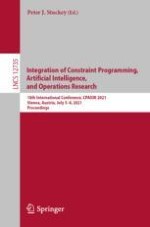2021 | OriginalPaper | Buchkapitel
A Computational Study of Constraint Programming Approaches for Resource-Constrained Project Scheduling with Autonomous Learning Effects
verfasst von : Alessandro Hill, Jordan Ticktin, Thomas W. M. Vossen
Erschienen in: Integration of Constraint Programming, Artificial Intelligence, and Operations Research
Aktivieren Sie unsere intelligente Suche, um passende Fachinhalte oder Patente zu finden.
Wählen Sie Textabschnitte aus um mit Künstlicher Intelligenz passenden Patente zu finden. powered by
Markieren Sie Textabschnitte, um KI-gestützt weitere passende Inhalte zu finden. powered by
